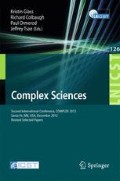Abstract
This research considers an economic intervention i.e. a paid sick leave policy to control an Influenza epidemic. Research has shown that “presenteeism” i.e. sick workers coming to work, costs employers more than “absenteeism” because sick workers put their coworkers at risk and are less productive.
We examined the costs and benefits of a paid sick leave policy through its effect on productivity, medical costs and attack rate. We considered two kinds of workers’ behavior: honest and rational. Honest workers take sick leave for days they are sick; but rational workers take all available sick leave. We ran agent-based epidemic simulations on large scale social contact networks with individual behavior modeling to study the coevolution of policy, behavior, and epidemics, as well as their impact on social welfare.
Our experimental results indicate that if the workers behave honestly, the society’s economic benefits increase monotonically with the number of paid sick days, however if the workers behave dishonestly but rationally, the society’s welfare is maximized when the number of paid sick days is equal to the number of mean days of sickness. This research shows that paid sick leave can be used as an effective policy instrument for controlling epidemics.
Access this chapter
Tax calculation will be finalised at checkout
Purchases are for personal use only
Preview
Unable to display preview. Download preview PDF.
References
Anderson, R., May, R.: Immunisation and herd immunity. Lancet 335(8690), 641–645 (1990)
Anderson, R., May, R., et al.: Vaccination and herd immunity to infectious diseases. Nature 318(6044), 323–329 (1985)
Barrett, C., Bisset, K., Eubank, S., Feng, X., Marathe, M.: Episimdemics: an efficient algorithm for simulating the spread of infectious disease over large realistic social networks. In: Supercomputing Conference, pp. 1–12. ACM/IEEE (2008)
Barrett, C., Bisset, K., Leidig, J., Marathe, A., Marathe, M.: An integrated modeling environment to study the co-evolution of networks, individual behavior, and epidemics. AI Magazine 31(1), 75–87 (2009)
Barrett, C., Bisset, K., Leidig, J., Marathe, A., Marathe, M.: Economic and social impact of influenza mitigation strategies by demographic class. Epidemics 3(1), 19–31 (2011)
Bisset, K., Chen, J., Feng, X., Kumar, V.A., Marathe, M.: EpiFast: a fast algorithm for large scale realistic epidemic simulations on distributed memory systems. In: Proceedings of the 23rd International Conference on Supercomputing (ICS), pp. 430–439 (2009)
Bisset, K., Marathe, M.: A cyber-environment to support pandemic planning and response. In: DOE SciDAC Magazine, pp. 36–47 (2009)
Burke, D., Epstein, J., Cummings, D., Parker, J., Cline, K., Singa, R., Chakravarty, S.: Individual-based computational modeling of smallpox epidemic control strategies. Academic Emergency Medicine 13(11), 1142–1149 (2006)
Burns, A., Mensbrugghe, D., Timmer, H.: Evaluating the economic consequences of avian influenza (2008)
Eubank, S., Guclu, H., Kumar, V.S.A., Marathe, M.V., Srinivasan, A., Toroczkai, Z., Wang, N.: Modelling disease outbreaks in realistic urban social networks. Nature 429, 180–184 (2004)
Gilleskie, D.: A dynamic stochastic model of medical care use and work absence. Econometrica, 1–45 (1998)
Grabowski, A., Rosinska, M.: The SIS model for assessment of epidemic control in a social network. Acta Physica Polonica Series B 37(5), 1521 (2006)
Halloran, E., Ferguson, N.M., Eubank, S., Ira, J., Longini Jr., I.M., Cummings, D.A.T., Lewis, B., Xu, S., Fraser, C., Vullikanti, A., Germann, T.C., Wagener, D., Beckman, R., Kadau, K., Barrett, C., Macken, C.A., Burke, D.S., Cooley, P.: Modeling targeted layered containment of an influenza pandemic in the United States. Proceedings of the National Academy of Sciences 105, 4639–4644 (2008)
Hemp, P.: Presenteeism: At work - but out of it. Harvard Business Review (October 2004)
Marathe, A., Lewis, B., Barrett, C., Chen, J., Marathe, M., Eubank, S., Ma, Y.: Comparing effectiveness of top-down and bottom-up strategies in containing influenza. PLoS ONE 6(9), e25149 (2011)
Meltzer, M., Cox, N., Fukuda, K.: The economic impact of pandemic influenza in the United States: Priorities for intervention. Emerg. Infect. Dis. 5(5), 659–671 (1999)
Skåtun, J.: Take some days off, why don’t you? Endogenous sick leave and pay. Journal of Health Economics 22(3), 379–402 (2003)
Taylor, C., Marathe, A., Beckman, R.: Same influenza vaccination strategies but different outcome across U.S. cities? International Journal of Infectious Diseases 14(9), e792–e795 (2010)
Whitley, R., Monto, A.: Seasonal and pandemic influenza preparedness: a global threat. Journal of Infectious Diseases 194(suppl. 2), S65–S69 (2006)
Author information
Authors and Affiliations
Editor information
Editors and Affiliations
Rights and permissions
Copyright information
© 2013 ICST Institute for Computer Science, Social Informatics and Telecommunications Engineering
About this paper
Cite this paper
Liao, S., Ma, Y., Chen, J., Marathe, A. (2013). Paid Sick-Leave: Is It a Good Way to Control Epidemics?. In: Glass, K., Colbaugh, R., Ormerod, P., Tsao, J. (eds) Complex Sciences. Complex 2012. Lecture Notes of the Institute for Computer Sciences, Social Informatics and Telecommunications Engineering, vol 126. Springer, Cham. https://doi.org/10.1007/978-3-319-03473-7_19
Download citation
DOI: https://doi.org/10.1007/978-3-319-03473-7_19
Publisher Name: Springer, Cham
Print ISBN: 978-3-319-03472-0
Online ISBN: 978-3-319-03473-7
eBook Packages: Computer ScienceComputer Science (R0)

